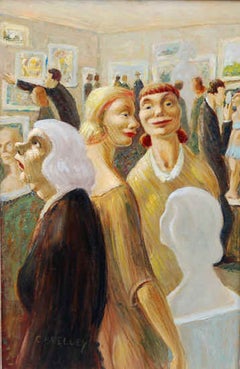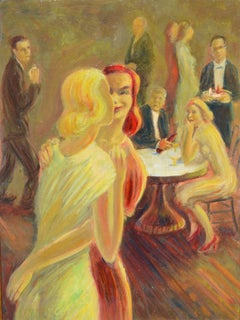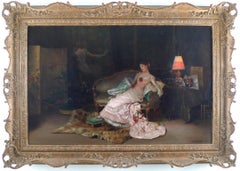Clyde Frederick Kelley Art
American
Clyde Frederick Kelley lived and worked in New York as an illustrator before settling in San Diego in 1924. Throughout his career he specialized in figurative, genre subjects that depicted American life in the 1930s–50s. His paintings mirrored the paintings of the American WPA movement, yet retained a sense of expressionism.
2
2
1
1
Overall Height
to
Overall Width
to
2
2
1
1
1
1
2
2
2
6,952
3,301
2,514
1,213
2
2
1
Artist: Clyde Frederick Kelley
The Art Gallery
By Clyde Frederick Kelley
Located in West Hollywood, CA
Clyde Frederick Kelley (1886-1965) lived and worked in New York as an illustrator before settling in San Diego in 1924. Throughout his career he specialized in figurative, genre subjects that depicted American life in the 1930s-1950??™s; his paintings mirrored the paintings of the American...
Category
1930s Clyde Frederick Kelley Art
Materials
Panel, Oil
Ladies Night
By Clyde Frederick Kelley
Located in West Hollywood, CA
Clyde Frederick Kelley (1886-1965) lived and worked in New York as an illustrator before settling in San Diego in 1924. Throughout his career he specialized in figurative, genre subjects that depicted American life in the 1930s-1950?€™s; his paintings mirrored the paintings of the American WPA movement, yet retained a sense of expressionism.
Ladies Night...
Category
1930s Clyde Frederick Kelley Art
Materials
Oil
Related Items
"A Reverie During The Ball", 19th Century Oil on Canvas by Rogelio Egusquiza
By Rogelio de Egusquiza y Barrena
Located in Madrid, ES
ROGELIO DE EGUSQUIZA
Spanish, 1845 - 1915
A REVERIE DURING THE BALL
signed and dated "Rogelio Egusquiza, 1879" (lower right)
oil on canvas
21-3/4 X 3...
Category
1870s Symbolist Clyde Frederick Kelley Art
Materials
Canvas, Oil
18th century oil sketches for a Baroque interior - a pair
Located in London, GB
A FEAST OF THE GODS WITH VENUS AND BACCHUS
Collections:
With Appleby Brothers, London, June 1957;
Hazlitt, Gooden & Fox, London, 1961;
John and Eileen Harris, acquired from the above, to 2015.
Literature:
Jacob Simon and Ellis Hillman, English Baroque Sketches: The Painted Interior in the Age of Thornhill, 1974, cat. no.12 (as by Louis Laguerre);
Elizabeth Einberg (ed.), Manners and Morals: Hogarth and British Painting, 1700-1760, exh. cat., London (Tate Gallery), 1987, cat. no.10 (as by Louis Laguerre);
Tabitha Barber and Tim Bachelor, British Baroque: Power and Illusion, exh. cat., London (Tate Britain), 2020.
Exhibited:
Twickenham, Marble Hill House, English Baroque Sketches: The Painted Interior in the Age of Thornhill, 1974, no.12 (as by Louis Laguerre);
London, Tate Gallery, Manners and Morals: Hogarth and British Painting, 1700-1760, 1987, no.10 (as by Louis Laguerre);
London, Tate Britain, British Baroque: Power and Illusion, cat. no 92, 2020.
CUPID AND PSYCHE BEFORE JUPITER
Collections:
With Appleby Brothers, London, June 1957;
Hazlitt, Gooden & Fox, London, 1961;
Anthony Hobson, acquired from the above, to 2015.
These recently re-united paintings are the most ambitious surviving baroque ceiling sketches made in Britain in the early eighteenth century. From the Restoration until the rise of Palladianism in the 1720s decorative history painting formed the preeminent artistic discipline in Britain. It was a field dominated by Continental artists including the Italian Antonio Verrio and the Frenchmen Louis Laguerre and Louis Chéron...
Category
Early 18th Century Baroque Clyde Frederick Kelley Art
Materials
Oil, Canvas
Le Cafe de la Place Blanche - Post Impressionist Oil, Figures by Elie Pavil
By Elie Anatole Pavil
Located in Marlow, Buckinghamshire
Signed figures in interior oil on panel circa 1915 by Russian-born post impressionist painter Elie Anatole Pavil. The piece depicts a couple in the famous "White Cross" cafe at the P...
Category
1910s Post-Impressionist Clyde Frederick Kelley Art
Materials
Oil, Panel
Gotich style Florentine painter - 19th century figure painting - Virgin Child -
Located in Varmo, IT
Florentine painter (19th century) - Madonna with Child on a gold background.
77 x 58 cm.
Oil on polylobed panel.
Condition report: Good state of conservation of the pictorial surf...
Category
Late 19th Century Gothic Clyde Frederick Kelley Art
Materials
Oil, Panel
Jules Rene HERVE, Maternity, Oil on Panel, 1935-1940
By Jules René Hervé
Located in Saint Amans des cots, FR
Oil on panel by Jules René HERVE, France, 1935-1940. "Maternity". Panel mounted on chassis. with frame: 39,5x34.2x5 cm - 15.6x13.4x2 inches - without frame: 27x22 cm - 10.6x8.7 inches. Signed lower left "Jules R Hervé...
Category
1930s Post-Impressionist Clyde Frederick Kelley Art
Materials
Oil, Panel
H 13.47 in W 15.56 in D 1.97 in
Giovanni Battista Pittoni, Holy Family with Cupids, Venetian Baroque, Christmas
By Giovanni Battista Pittoni
Located in Greven, DE
In 2001 the German art historian Art historian and Raphael Expert, Prof. Jürg Meyer zur Capellen, published the painting "Die Heilige Familie" in a monographic article, ascribing the present work to the Venetian painter Giovanni Battista Pittoni (1687 -Venice - 1767). (Newspaper "Weltkunst", October 2001, No 12, p. 1850 f. ill.)
He describes it as a typical work by this artist. Pittoni was one of the most influential and successful artists of the Venetian Settecento. He was a pupil of the Veronese Master Giovanni Balestra (1666-1740). His style is influenced by Sebastiano Ricci (1659-1734) and Giambattista Tiepolo (1696-1770).
Giovanni Battista Pittoni was already successful at a young age and soon lead his own workshop.
He created large-scale hitoria paintings, as well as large, religious altarpieces. In addition to Venetian and Upper Italian patrons, Pittoni also had many interested parties from Europe. His work is accordingly scattered in many different museums and private collections today. Pittoni - like other painter colleagues of his time - repeated his own compositions both by hand and with the help of his workshop. He repeatedly incorporated details into other pictures and contexts.
Prof. Meyer zur Capellen noted the very good condition of the present work and the high quality of the paint with fine graduations and the vivid brushstrokes.
Provenance: The panting has not been on the art market for at least 300 years. In the year 2000 the work was donated by the Münster-based, Noble Family Ketteler zu Harkotten to a private collection in Westphalia. Most probably the canon Nikolaus Hermann von Ketteler zu Harkotten bought the piece in Venice in 1750 together with the altarpiece of the Clemens Church in Münster.
On the reverse of the work is a fideicommissum number by Ketteler zu Harkotten.
As it belonged to the family commission, the painting was inalienable until 1919, when the corresponding law was repealed, and after that time it remained in the family's possession without interruption. Pittoni's only direct relationship to Münster is the commission for the high altar painting of the Baroque St. Clemens Church. It can be assumed that then canon von Ketteler saw this painting in the artist's workshop during his stay in Venice and acquired it for himself. This would also explain the discrepancy in dating. (ca. 1735/1750). However, it is also possible that the painting originated in the possession of Ferdinand von Plettenberg...
Category
Early 18th Century Rococo Clyde Frederick Kelley Art
Materials
Canvas, Oil
17th century European oil, Christ and his disciples seated around a table.
Located in Woodbury, CT
17th century European oil, Christ and is disciples seated around a table.
An interesting and very unique painting.
Possibly a fragment originally from a piece of furniture.
The s...
Category
1650s Old Masters Clyde Frederick Kelley Art
Materials
Wood Panel, Oil
Free Shipping
H 11.5 in W 27 in
"The Painter and his Model", 19th C. Oil on Mahogany Wood Panel by E. L. Garrido
By Eduardo Leon Garrido
Located in Madrid, ES
EDUARDO LEÓN GARRIDO
Spanish, 1856- 1949
THE PAINTER AND HIS MODEL
signed "E. L Garrido" (lower right)
oil on mahogany wood panel
19-3/4 x 24-1/8 inches (50 x 61 cm.)
framed: 28-1/2 x 32-3/4 inches (72 x 83 cm.)
PROVENANCE
Private Spanish Collector
Eduardo León Garrido (Madrid, 1856 - Caen, 1949) was a Spanish painter. He began his training at the Higher School of Painting in Madrid and as a disciple in Vicente Palmaroli...
Category
Early 1900s Realist Clyde Frederick Kelley Art
Materials
Wood Panel, Oil
"Playing hide and seek", 19th Century Oil on Panel by Vicente Palmaroli, Spanish
Located in Madrid, ES
VICNTE PALMAROLI y GONZÁLEZ
Spanish, 1834 - 1896
PLAYING HIDE AND SEEK
signed "V. Palmaroli" (lower right)
oil on mahogany panel
17-3/4 x 13-1/2 inches (45 X 34 cm.)
framed: 25-1/4 X 21-1/4 inches (64 X 53.7 cm.)
PROVENANCE
Leslie Hindman Inc., Auctionners
Private Collector, Madrid
Oil on table by Vicente Palmaroli...
Category
Late 19th Century Romantic Clyde Frederick Kelley Art
Materials
Oil, Wood Panel
Seated Figure
Located in Rockland, ME
Sally Michel Biography
American, 1902-2003
Sally Michel Avery was an American painter known for her lyrical depictions of everyday life. Though she used techniques and stylized form...
Category
1980s American Modern Clyde Frederick Kelley Art
Materials
Oil
Behind Pretty Things (2022), oil on wood panel, portrait, patterns, faux naif
By Max Vesuvius Budnick
Located in Jersey City, NJ
Behind Pretty Things (2022), oil on wood panel painting by Max Vesuvius Budnick, portrait, patterns, faux naif
Classic faux naif portrait and interiors oil painting by Max Vesuvius Budnick. The artist cannot resist painting an appealing pattern and loves to render them by hand. In this painting he renders the ribbed pattern of his green corduroy hat, the tropical jungle motif of his bandana neckerchief complete with tropical birds, the tropical palm leaf pattern of his cell phone case, the blue stripe pattern of his button down shirt and the purple gradient of the walls behind him as he poses for a selfie in the mirror. His red beard peeks out from behind his bandana and on the wall behind him is a framed print of the painting, "Floral Still Life," by WWI veteran and African American artist, Horace Pippin...
Category
2010s Contemporary Clyde Frederick Kelley Art
Materials
Oil, Wood, Wood Panel
H 17.5 in W 13.5 in D 1.75 in
Old Men with Kittens - Impressionist Oil, Figures in Interior by J F Raffaelli
By Jean-Francois Raffaelli
Located in Marlow, Buckinghamshire
A wonderful oil on panel by French impressionist painter Jean-Francois Raffaelli depicting two old men seated in an interior. One is reading his paper as the other naps and there are several kittens on the floor. Painted in the artist's distinctive style. The work is accompanied by a certificate from Brame & Lorenceau and is included in the catalogue raisonne of the painter.
Signature:
Signed lower left
Dimensions:
Framed: 9.5"x8"
Unframed: 5.5"x4"
Provenance:
Private collection - United States
Original artists label verso
Jean-François Raffaëlli's father was a failed Italian businessman and Raffaëlli himself was, among other things, a church chorister, actor and theatre singer. He then studied under Gérôme at the École des Beaux-Arts in Paris. He travelled to Italy, Spain and Algeria and on his return to France settled in Asnières.
In 1876, on a trip to Brittany, he first saw the potential of realist subject matter, if treated seriously. He became involved in meetings of artists at the Café Guerbois, where the Impressionist painters used to gather. As a result, Degas, contrary to the advice of the group, introduced Raffaëlli to the Impressionist exhibitions - according to one uncertain source as early as the very first exhibition, at the home of Nadar, and certainly to those of 1880 and 1881.
In 1904, Raffaëlli founded the Society for Original Colour Engraving. He first exhibited at the Salon de Paris in 1870 and continued to exhibit there until he joined the Salon des Artistes Français in 1881, where he earned a commendation in 1885, was made Chevalier of the Légion d'Honneur in 1889 and in the same year was awarded a gold medal at the Exposition Universelle. In 1906 he was made Officier of the Légion d'Honneur. He was also a member of the Société Nationale des Beaux-Arts. In 1884, a private exhibition of his work cemented his reputation.
He contributed to several newspapers such as The Black Cat (Le Chat Noir) in 1885 and The French Mail (Le Courrier Français) in 1886 and 1887. He published a collection entitled Parisian Characters, which captured his favourite themes of the street, the neighbourhood and local people going about their lives. In 1880 he participated, with Forain, on the illustration of Joris Karl Huysmans' Parisian Sketches (Croquis Parisiens). He also illustrated Huysman's Works. As well as working as an illustrator, he also made etchings and coloured dry-points.
His early attempts at painting were genre scenes, but once he was settled in Asnières he started to paint picturesque views of Parisian suburbs. From 1879 onwards, his subject matter drew on the lives of local people. These popular themes, which he treated with humanity and a social conscience, brought him to the attention of the social realist writers of the time such as Émile Zola. In addition to his realist style, Raffaëlli's dark palette, which ran contrary to the Impressionist aesthethic, helped to explain the opposition of those painters to his participation in their exhibitions. More concerned with drawing than colour, he used black and white for most of his paintings. Towards the end of his life, he lightened his palette, but without adopting any other principles of the Impressionist technique.
After painting several portraits, including Edmond de Goncourt and Georges Clémenceau, he returned to genre painting, particularly scenes of bourgeois life. Later in his career, he painted mainly Breton-inspired sailors and views of Venice. His views of the Paris slums and the fortifications, sites which have almost completely disappeared, went some way towards establishing a genre in themselves and perpetuated the memory of the area: The Slums, Rag-and-Bone Man, Vagabond, Sandpit, In St-Denis, Area of Fortifications. His realistic and witty portrayal of typical Parisian townscapes accounts for his enduring appeal.
Born in Paris, he was of Tuscan descent through his paternal grandparents. He showed an interest in music and theatre before becoming a painter in 1870. One of his landscape paintings was accepted for exhibition at the Salon in that same year. In October 1871 he began three months of study under Jean-Léon Gérôme at the École des Beaux-Arts in Paris; he had no other formal training.
Raffaëlli produced primarily costume pictures until 1876, when he began to depict the people of his time—particularly peasants, workers, and ragpickers seen in the suburbs of Paris—in a realistic style. His new work was championed by influential critics such as J.-K. Huysmans, as well as by Edgar Degas.
The ragpicker became for Raffaëlli a symbol of the alienation of the individual in modern society. Art historian Barbara S. Fields has written of Raffaëlli's interest in the positivist philosophy of Hippolyte-Adolphe Taine, which led him to articulate a theory of realism that he christened caractérisme. He hoped to set himself apart from those unthinking, so-called realist artists whose art provided the viewer with only a literal depiction of nature. His careful observation of man in his milieu paralleled the anti-aesthetic, anti-romantic approach of the literary Naturalists, such as Zola and Huysmans.
Degas invited Raffaëlli to participate in the Impressionist exhibitions of 1880 and 1881, an action that bitterly divided the group; not only was Raffaëlli not an Impressionist, but he threatened to dominate the 1880 exhibition with his outsized display of 37 works. Monet, resentful of Degas's insistence on expanding the Impressionist exhibitions by including several realists, chose not to exhibit, complaining, "The little chapel has become a commonplace school which opens its doors to the first dauber to come along."An example of Raffaëlli's work from this period is Les buveurs d'absinthe (1881, in the California Palace of Legion of Honor Art Museum in San Francisco). Originally titled Les déclassés, the painting was widely praised at the 1881 exhibit.
After winning the Légion d'honneur in 1889, Raffaëlli shifted his attention from the suburbs of Paris to city itself, and the street scenes that resulted were well received by the public and the critics. He made a number of sculptures, but these are known today only through photographs.[2] His work was also part of the painting event in the art competition at the 1912 Summer Olympics. In the later years of his life, he concentrated on color printmaking. Raffaëlli died in Paris on February 11, 1924
Museum and Gallery Holdings:
Béziers: Peasants Going to Town
Bordeaux: Bohemians at a Café
Boston: Notre-Dame; Return from the Market
Brussels: Chevet of Notre-Dame; pastel
Bucharest (Muz. National de Arta al României): Market at Antibes; Pied-à-terre
Copenhagen: Fishermen on the Beach
Douai: Return from the Market; Blacksmiths
Liège: Absinthe Drinker...
Category
1890s Impressionist Clyde Frederick Kelley Art
Materials
Panel, Oil
Clyde Frederick Kelley art for sale on 1stDibs.
Find a wide variety of authentic Clyde Frederick Kelley art available for sale on 1stDibs. You can also browse by medium to find art by Clyde Frederick Kelley in oil paint, paint, panel and more. Not every interior allows for large Clyde Frederick Kelley art, so small editions measuring 15 inches across are available. Customers who are interested in this artist might also find the work of Arthur Osver, Mervin Jules, and Donald S. Vogel.



